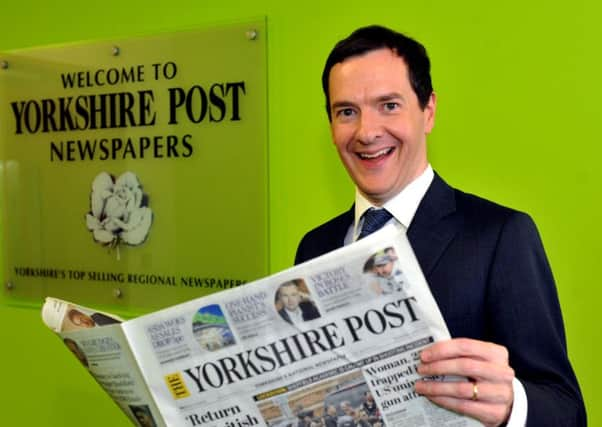YP Comment: Osborne makes case for the EU. Opportunities must be stressed


Though the Chancellor accepts that the outcome will be “very close”, he is putting his faith in the conservative instincts of the British people. As electoral history shows, polls are decided by the party, or campaign in this instance, which offers the most plausible economic argument.
On this basis, those advocating the status quo appear to be in a slightly stronger position than the Brexiteers. There is every likelihood that Britain’s tenuous recovery from the recession will go into reverse if the country leaves the EU and Mr Osborne used every opportunity to emphasise this risk without resorting to some of the more colourful – and alarmist – language that has characterised the campaign thus far.
Advertisement
Hide AdAdvertisement
Hide AdEven though the Chancellor still believes – passionately – that it was the correct political strategy to call a referendum despite the risks, he cannot afford to take anything for granted in the remaining days. As he acknowledged, the European Union is being blamed – erroneously – for all of Britain’s ills, not least on those illegal immigrants from non-EU countries who have been trying to breach this country’s borders by sea.
But Mr Osborne clearly believes that significant opportunities will exist if Britain remains in a reformed EU. As Chancellor and political strategist, his challenge now is describing these ‘opportunities’ in a clear manner without resorting to scaremongering, explaining how the Government can – and will – persuade the European elite’s undemocratic institutions to mend their ways and then convince a sceptical country that these promises will, in fact, be honoured by a Prime Minister and Chancellor with previous form when it comes to U-turns. Both men still have much to prove.
Careers challenge: Making sure pupils are informed
GEORGE OSBORNE spoke eloquently about the importance of EU referendum voters thinking about the next generation when they cast their votes on June 23.
Yet, irrespective of the outcome, young people across the country will not fulfil their potential unless there is another concerted push on school standards.
Advertisement
Hide AdAdvertisement
Hide AdThe issue’s importance is already well-documented here in Yorkshire. Despite the best endeavours of schools, often in trying circumstances, it is simply unacceptable that this region continues to remain rooted at the bottom of national league tables.
However, there are other barometers of academic attainment which also need addressing; namely the extent to which girls continue to out-perform boys and how they are more aware by the age of 13 about university and its advantages according to new Sutton Trust research.
This does, of course, need to be placed in wider context. Some pupils are faster learners than others while others will find it quite daunting to think about a possible career path in their early teens – and this is before a debate about whether they can afford higher education or whether it is the right choice for them or not.
What this report demonstrates, however, is the need for a far more effective relationship between schools, universities, businesses and careers officers. Though today’s generation is the most informed in history thanks to advances like the internet, it is important that pupils have the necessary guidance so they make the right choice for their needs as the global economic landscape continues to evolve by the day.
Hip, hip hooray: Marvels of modern medicine
Advertisement
Hide AdAdvertisement
Hide AdTHE MARVELS of modern medicine never cease to amaze, not least the amazing case of retired electrician Chris Walker, from Beverley, becoming the first patient to undergo a hip replacement – and be released from hospital – on the same day.
Good news for the NHS as hospitals face record demand for their services, it’s also good news for pioneering Sheffield company JRI Orthopaedics which is at the forefront of trials to fast-track hip and knee replacement surgery so such procedures are less invasive in the future.
Yet, while speed is increasingly of the essence, patients like Mr Walker will only benefit from these new surgical innovations if there is adequate after-care in place. If not, it increases the likelihood of them being re-admitted to hospital, therefore defeating the very object of the exercise. This principle does not just apply to hip surgery; a lack of co-ordination between hospitals and community carers is a root cause of the Health Service’s ills.